|
|
|
Sort Order |
|
|
|
Items / Page
|
|
|
|
|
|
|
| Srl | Item |
| 1 |
ID:
151460
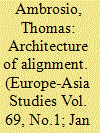

|
|
|
|
|
| Summary/Abstract |
The relative durability of the growing alignment between Russia and China is perhaps the central question regarding this relationship. This article examines the degree to which cooperation and policy coordination have become institutionalised between these two states through the creation of a complex and self-reinforcing network of bilateral and multilateral agreements. Grounded in the literature on treaty nestedness and utilising social network analysis, this article examines 154 bilateral Russia–China agreements and 54 agreements and declarations signed under the Shanghai Cooperation Organisation.
|
|
|
|
|
|
|
|
|
|
|
|
|
|
|
|
| 2 |
ID:
140193


|
|
|
|
|
| Publication |
Washington, DC, US Government Printing Office, 1970.
|
| Description |
xiv, 500p.hbk
|
|
|
|
|
|
|
|
|
|
|
|
Copies: C:1/I:0,R:0,Q:0
Circulation
| Accession# | Call# | Current Location | Status | Policy | Location |
| 035907 | 951.73032/DUP 035907 | Main | On Shelf | General | |
|
|
|
|
| 3 |
ID:
186187


|
|
|
|
|
| Summary/Abstract |
How do voters want their governments to respond when another country unilaterally withdraws from an international institution? We distinguish between negotiation approaches that vary in the degree to which they accommodate the withdrawing state's demands and argue that negotiation preferences are shaped by two issues. The first is voters’ exposure to the costs and benefits of accommodation. This exposure varies across issues, and we argue that citizens will generally prefer non-accommodation on zero-sum issues, but support more accommodation on cooperation issues, where non-accommodation puts existing cooperation gains at risk. Second, withdrawal negotiations create precedents, and citizens should therefore be less willing to accommodate the more they are concerned about the ripple effects of accommodation on the institution's stability. These concerns also confront citizens with two types of dilemmas depending on how favorably they view the institution themselves. To test our argument, we use survey evidence and a conjoint experiment conducted in Germany and Spain during the Brexit negotiations. We find that respondents overall are more willing to accommodate the UK on cooperation issues than on zero-sum issues, but also find evidence that Euroskeptics and Europhiles confront different issue-specific dilemmas. Our paper contributes to a better understanding of the dynamics surrounding the challenges to multilateralism that have proliferated in recent years.
|
|
|
|
|
|
|
|
|
|
|
|
|
|
|
|
| 4 |
ID:
087862
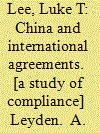

|
|
|
|
|
| Publication |
Leyden, A. W. Sijthoff, 1969.
|
| Description |
231p.
|
|
|
|
|
|
|
|
|
|
|
|
Copies: C:1/I:0,R:0,Q:0
Circulation
| Accession# | Call# | Current Location | Status | Policy | Location |
| 008696 | 341.370951/LEE 008696 | Main | Withdrawn | General | |
|
|
|
|
| 5 |
ID:
109201


|
|
|
|
|
| Publication |
2011.
|
| Summary/Abstract |
Compliance mechanisms in multilateral environmental agreements (MEAs) have slowly but certainly replaced the classic dispute settlement procedures as the preferred means to ensure compliance with environmental obligations in public international law and their importance is growing. These mechanisms and procedures apply uniquely to the treaties that created them. At the same time, they show remarkable overlap and similarities. This article looks into the practice of 22 MEAs and compares the compliance mechanisms, procedures and practices found in these international agreements to the classic dispute settlement procedures. Based on this analysis, conclusions are drawn on the necessity and effectiveness of these compliance mechanisms in MEAs.
|
|
|
|
|
|
|
|
|
|
|
|
|
|
|
|
| 6 |
ID:
121848


|
|
|
|
|
| Publication |
2013.
|
| Summary/Abstract |
This article introduces the Continent of International Law (COIL) research project on international agreement design. COIL stems from the conviction that the International Organization subfield's focus on the couple hundred international organizations with physical headquarters had to be broadened to include the tens of thousands extant international agreements, that is, international law. Each piece of international law can and should be studied as an institution. Together, this set of institutions, which truly is a "continent," is theoretically very interesting and empirically very diversified. COIL's basic theoretical premise is that international agreement design and comparison across agreements begins by understanding the underlying cooperation problem(s) the agreements are trying to solve. COIL identifies 12 distinct and recurrent cooperation problems, which may occur alone or in combinations. The data collection features a random sample of international agreements conditional on the issue areas of economics, environment, human rights, and security. The first large-n, systematic operationalization of the cooperation problems underlying real international agreements is highlighted, and descriptive statistics are presented - some of which challenge conventional wisdom. For instance, enforcement problems (Prisoner's Dilemma-like situations) are important, but far from universal, with 30% of the agreements characterized by that underlying problem. The numerous and diverse COIL variables allow for a multi-dimensional operationalization of the difficult-to-measure concept of the "incomplete contract." Hypotheses from contract theory are tested, confirming the appropriateness of the new measure, the weakness of measures based on number of pages, and most significant, the rationality and efficiency of the continent of international law.
|
|
|
|
|
|
|
|
|
|
|
|
|
|
|
|
| 7 |
ID:
101387
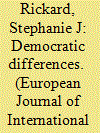

|
|
|
|
|
| Publication |
2010.
|
| Summary/Abstract |
A growing body of literature argues that democracies are more likely to comply with international agreements than authoritarian states. However, substantial variation exists in the compliance behaviour of democracies. How can this variation be explained? The same mechanism that links regime type to compliance, namely electoral competition, also explains variation in compliance among democracies. This is because the nature of electoral competition varies across democratic systems. An analysis of democratic GATT/WTO member countries from 1980 to 2003 reveals that governments elected via majoritarian electoral rules and/or single-member districts are more likely to violate GATT/WTO agreements than those elected via proportional electoral rules and/or multi-member districts.
|
|
|
|
|
|
|
|
|
|
|
|
|
|
|
|
| 8 |
ID:
139794


|
|
|
|
|
| Summary/Abstract |
This research note hypothesizes that international agreements including a finite duration provision or with a shorter expected duration should take less time to negotiate. Using a random sample of agreements across different issue areas, it finds statistical support for this hypothesis. Agreements without a finite duration provision experienced a bargaining phase that was twice as long as agreements including a finite duration provision and otherwise short-term agreements. This result not only offers empirical support for the theoretical proposition that a longer shadow of the future leads to increased bargaining delay—it also has important policy implications. International negotiators can include a finite duration provision when they prefer a shorter bargaining phase to a potentially more durable agreement, and they can avoid this feature when they prefer a more durable agreement, although this decision comes with the cost of additional bargaining delay. By treating finite duration provisions as an independent variable, this result also addresses a critique of the research program on the rational design of international institutions that it moves backward by considering only design features as dependent variables.
|
|
|
|
|
|
|
|
|
|
|
|
|
|
|
|
| 9 |
ID:
175311
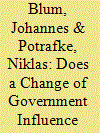

|
|
|
|
|
| Summary/Abstract |
We examine whether changes of government influence compliance with international agreements. We investigate compliance with the NATO two percent target to which all NATO countries committed themselves during the NATO summit in Wales in 2014. The dataset includes the military expenditure by NATO countries over the period 2010–2018. The results suggest that countries that do not (yet) comply with the two percent target have smaller growth rates in military expenditure relative to GDP when they experienced a large change of government, e.g. a change from a rightwing to a leftwing government, than countries that did not experience such a large change of government since the NATO summit in 2014. Countries that experienced a large change of government are, thus, less likely to comply with the two percent target. Future research should examine the credibility problem of national governments in other international agreements too.
|
|
|
|
|
|
|
|
|
|
|
|
|
|
|
|
| 10 |
ID:
186192


|
|
|
|
|
| Summary/Abstract |
How does naming and shaming affect public support for compliance with international agreements? We investigated this question by conducting survey experiments about the Paris Agreement, which relies on social pressure for enforcement. Our experiments, administered to national samples in the United States, produced three sets of findings. First, shaming by foreign countries shifted domestic public opinion in favor of compliance, increasing the political incentive to honor the Paris Agreement. Second, the effects of shaming varied with the behavior of the target. Shaming was more effective against partial compliers than against targets that took no action or honored their obligations completely. Moreover, even partial compliers managed to reduce the effects of shaming through the strategic use of counter-rhetoric. Third, identity moderated responses to shaming. Shaming by allies was not significantly more effective than shaming by non-allies, but Democrats were more receptive to shaming than Republicans. Overall, our experiments expose both the power and the limits of shaming as a strategy for enforcing the Paris Agreement. At the same time, they advance our understanding of the most significant environmental problem facing the planet.
|
|
|
|
|
|
|
|
|
|
|
|
|
|
|
|
| 11 |
ID:
133651


|
|
|
|
|
| Publication |
2014.
|
| Summary/Abstract |
We analyze forms of environmental activism that eschew the "information and socialization" politics typically associated with Transnational Advocacy Groups (TAGs) and instead favor direct, confrontational strategies, whose aim is to enforce international law. While mainstream TAGs typically seek influence through norm entrepreneurship, lobbying or "naming and shaming", what we label Direct Enforcement (DE) intervenes directly to halt (purportedly) illegal practices by states and private actors. DE activism has been most visible in transnational campaigns to protect endangered marine species, where environmental groups have resorted to damaging equipment used for illegal fishing and boarding fishing boats to enforce maritime conservation law. Often branded as eco-terrorism, such confrontational strategies have been largely ignored by scholarly literature on transnational activism. We contend that DE merits closer attention by IR-scholars for two reasons. First, DE activism plays an important role in enhancing the compliance pull of international laws in an area-the global environment-where states often lack capacity and political will to enforce international agreements. Second, an analysis of DE-activism provides important insights about issue selection and relative campaign success under different structural circumstances, thereby expanding our understanding of transnational advocacy more generally.
|
|
|
|
|
|
|
|
|
|
|
|
|
|
|
|
| 12 |
ID:
117994
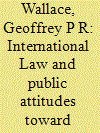

|
|
|
|
|
| Publication |
2013.
|
| Summary/Abstract |
Domestic approaches to compliance with international commitments often presume that international law has a distinct effect on the beliefs and preferences of national publics. Studies attempting to estimate the consequences of international law unfortunately face a wide range of empirical and methodological challenges. This article uses an experimental design embedded in two U.S. national surveys to offer direct systematic evidence of international law's effect on mass attitudes. To provide a relatively tough test for international law, the surveys examine public attitudes toward the use of torture, an issue in which national security concerns are often considered paramount. Contrary to the common contention of international law's inefficacy, I find that legal commitments have a discernible impact on public support for the use of torture. The effect of international law is also strongest in those contexts where pressures to resort to torture are at their highest. However, the effects of different dimensions in the level of international agreements' legalization are far from uniform. In contrast to the attention often devoted to binding rules, I find that the level of obligation seems to make little difference on public attitudes toward torture. Rather, the relative precision of the rules, along with the degree to which enforcement is delegated to third parties, plays a much greater role in shaping public preferences. Across both international law and legalization, an individual's political ideology also exerts a strong mediating effect, though in varying directions depending on the design of the agreement. The findings have implications for understanding the overall impact of international law on domestic actors, the importance of institutional design, and the role of political ideology on compliance with international agreements.
|
|
|
|
|
|
|
|
|
|
|
|
|
|
|
|
| 13 |
ID:
147551


|
|
|
|
|
| Summary/Abstract |
To reach agreement, international negotiators often compromise by using flexible language: they make controversial provisions vague, or add options and caveats. Does flexibility in agreement language influence subsequent state behavior? If so, do states follow both firm and flexible language somewhat, as negotiators hope? Or do governments respond strategically, increasing their energies on firmly specified tasks, and reducing their efforts on flexibly specified ones? Testing theories about agreement language is difficult because states often reserve flexible language for controversial provisions. To make causal claims, we study an unusually drafted agreement in which states had almost no opportunity to dilute agreement language. We examine the influence of the 1991 Paris Principles on the Design of National Human Rights Institutions (NHRIs), using an original data set of twenty-two institutional safeguards of NHRIs in 107 countries, and case studies. We find that variations in agreement language can have large effects on state behavior, even when the entire agreement is nonbinding. Both democracies and authoritarian states followed the principles' firm terms closely. However, authoritarian states either ignored or reduced their efforts on flexibly specified tasks. If flexibly specifying a task is no different from omitting it altogether, as our data suggest, the costs of compromise are much greater than previously believed.
|
|
|
|
|
|
|
|
|
|
|
|
|
|
|
|
| 14 |
ID:
046995


|
|
|
|
|
| Publication |
Cambridge, Cambridge University Press, 2000.
|
| Description |
466p.
|
| Standard Number |
052180082X
|
|
|
|
|
|
|
|
|
|
|
|
Copies: C:1/I:0,R:0,Q:0
Circulation
| Accession# | Call# | Current Location | Status | Policy | Location |
| 044589 | 338.926/MET 044589 | Main | On Shelf | General | |
|
|
|
|
| 15 |
ID:
134002


|
|
|
|
|
| Publication |
2014.
|
| Summary/Abstract |
Sandwiched between Russia and China, Mongolia has long been dominated by the two giants that surround it. Indeed, for most of the past four centuries, the choice between its neighbors' influence has been an either-or proposition. With the brief exception of Japan's intervention on the Asian mainland during World War II, there were no external powers that Mongolia could conceivably approach to soften the harsh Russia-China alternative. In recent years, though, the situation has changed dramatically. For the first time in modern history, Mongolia has asserted its sovereign right to engage in numerous bilateral relationships outside the old Russia-China dynamic, focusing on both strategic affairs and economics. In 2013 alone, the nation signed 63 bilateral and international agreements.
|
|
|
|
|
|
|
|
|
|
|
|
|
|
|
|
| 16 |
ID:
129395


|
|
|
| 17 |
ID:
158375


|
|
|
|
|
| Summary/Abstract |
International relations scholarship has made great progress on the study of compliance with international agreements. While persuasive, most of this work has focused on states’ de jure compliance decisions, largely excluding the de facto behavior of nonstate actors whose actions the agreement hopes to constrain. Of particular interest has been whether the OECD Anti-Bribery Convention (ABC) might reduce the propensity of multinational corporations (MNCs) to bribe officials in host countries through its mechanisms of extraterritoriality and extensive peer review. Unfortunately, research is hampered by reporting bias. Since the convention raises the probability of investors’ punishment for bribery in their home countries, it reduces both the incentives for bribery and willingness to admit to the activity. This generates uncertainty over which of these incentives drives any correlation between signing the convention and reductions in reported bribery. We address this problem by employing a specialized survey experiment that shields respondents and reduces reporting bias. We find that after the onset of Phase 3 in 2010, when the risk of noncompliance increased for firms subject to the OECD-ABC, those MNCs reduced their actual bribery relative to their nonsignatory competitors.
|
|
|
|
|
|
|
|
|
|
|
|
|
|
|
|
| 18 |
ID:
123757


|
|
|
|
|
| Publication |
2013.
|
| Summary/Abstract |
Diplomatic power and influence, coexistence-style, concerns the ability to determine the framework governing international security management. It requires a programme for international order that devises methods on how to manage the use of force, jurisdiction over peoples and territory and international agreements. China's diplomatic strategy is based on its constitutional concept of peaceful coexistence. This concept has been translated into a programme for order that involves governmental consent, United Nations' (UN) authorisation and approval from regional or functional UN-based organisations as a requirement for using force; effective control and respect for the legal equality of states as a precondition for exercising jurisdiction over peoples and territory; and absolute sovereignty as a basis for the validity of international agreements. The dominant element of Beijing's strategy is coexistence diplomacy, which has allowed China to become a maker of international order.
|
|
|
|
|
|
|
|
|
|
|
|
|
|
|
|
| 19 |
ID:
184046
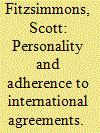

|
|
|
|
|
| Summary/Abstract |
Although Donald Trump’s foreign policy behavior is often characterized as erratic and unpredictable, he was remarkably consistent in his hostility toward international agreements. The president withdrew or threatened to withdraw the United States from several agreements and consistently characterized agreements as ‘horrible deals’ that ‘cheat’ his country. This article explores why Trump exhibited such consistent disdain for international agreements. To address this question, it develops propositions that draw a causal link between a leader’s personality traits and their willingness to challenge constraints: a leader with a relatively high belief in their ability to control events is more likely to challenge constraints than a leader with a lower belief in their ability to control events; moreover, a leader with a relatively high level of distrust of others is more likely to challenge constraints than a leader with a lower level of distrust of others. The article then conducts a plausibility test of these propositions in the context of Trump’s decisions to withdraw from agreements in three significant policy areas: trade (the Trans-Pacific Partnership), environmental stewardship (the Paris Agreement on climate change), and nuclear proliferation (the Iran nuclear deal).
|
|
|
|
|
|
|
|
|
|
|
|
|
|
|
|
| 20 |
ID:
131491
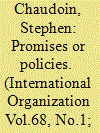

|
|
|
|
|
| Publication |
2014.
|
| Summary/Abstract |
A key assumption of audience costs theories of crisis bargaining and international cooperation is that audience members have strong preferences for consistency between their leader's commitments and actual policy choices. However, audiences also have strong preferences over the policy choices themselves, regardless of their consistency with past commitments. I conducted a randomized survey experiment to evaluate the magnitude of consistency and policy effects in the context of international agreements over trade policy. Respondents with expressed policy preferences, whether supporting or opposing free trade, have muted reactions to learning that their leader has broken an agreement. Only respondents with no opinion on trade policy are affected by learning that their leader's policy is inconsistent with prior commitments. This suggests that constituents' underlying preferences limit the degree to which audience costs influence policymakers' calculations
|
|
|
|
|
|
|
|
|
|
|
|
|
|
|
|
|
|
|
|
|